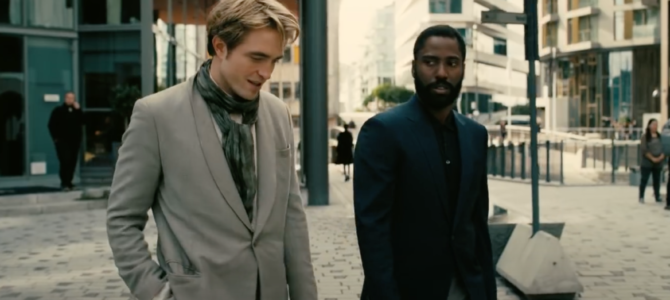
“Watch movies on the big screen in 2020—at 1920 Prices.” That’s how the nation’s largest movie exhibitor chain, AMC Theaters, touted its plans to reopen two-thirds of U.S. locations on Aug. 20. With 15-cent tickets to watch past hits like “Back to the Future,” AMC is undercutting rivals Regal and Cinemark.
“Because we’re starved for entertainment, audiences are looking for comfort food,” says Christian Toto, editor of Hollywood in Toto, who lives near Denver. “The one original title that has a lot of potential is ‘Tenet’ from Christopher Nolan, which has had buzz for over a year.”
While three previous premiere dates were pushed back due to COVID-related theater closures, Warner Bros. has set Sept. 3 as the U.S. release date for “Tenet,” a sci-fi thriller from the award-winning “Dunkirk” filmmaker. The venerable studio is hoping Nolan’s latest, filmed in IMAX, will do big business particularly on large-format screens.
A practicing emergency medicine physician urges Americans considering returning to theaters to analyze current risks in their area. “This is still a challenging disease,” said Dr. Amesh Adalja, who works in a Pittsburgh-area hospital. “There are still an unacceptable number of deaths occurring every day. At a movie theater, you’re more likely to be in contact with people who are not part of your quarantine circle, and you’re indoors with them for a prolonged period of time. It’s challenging to delimit the risk in that type of situation.”
After nearly six months of closed theaters, other movie studios are hedging their bets. “Bill And Ted Face the Music,” a threequel to a 1980s cult classic comedy, will release simultaneously in theaters and as a $20 streaming rental on Aug. 28. Disney is also trying out a novel streaming release plan for its live-action “Mulan” drama.
Many wonder if months of shelter-in-place policies have led to a sea-change in Americans’ viewing habits. “Is this pandemic breaking our cultural pattern of going to the movies and seeing that as a viable source of entertainment?” asked Toto. “We as a nation may be getting accustomed to watching everything at home, not just the occasional Netflix series.”
Will ‘Tenet’ Bring Moviegoers Back?
With lives lost, jobs cuts, and economies worldwide crippled due to COVID-19, some may question why going to the movies matters in the big picture.
“If I go to see the latest ‘Fast and Furious,’ even if it’s not great, or even good, it’s going to blow me out of my chair,” Toto said. “It’s going to be a sensory overload experience. And that’s part of the reason why we go to the movies.”
In an era where franchises rule the box office, Nolan has joined the ranks of Steven Spielberg and James Cameron: directors who can make big-budget original films that still turn a profit. After multiple trailers, people have few clues what the sci-fi flick “Tenet” is about—and they eagerly await it. “He creates this air of mystery,” said Toto. “Christopher Nolan movies are an event that you want to see in a big theater. So if any movie can get us going, it’s that one.”
A few smaller releases hope to ride the coattails of “Tenet,” including Cold War drama “The Courier” featuring Benedict Cumberbatch, and reimagined Dickens comedy “The Personal History of David Copperfield.” Russell Crowe’s “Unhinged” arrives a week earlier.
ER Physician Addresses Safety Concerns
Emergency physician Adalja, also a senior scholar at Johns Hopkins University Center for Health Security, sees positive signs for the United Sates such as a declining case fatality rate. “Each day, we’re learning more about this virus and improving our care of patients,” he said. “We understand a lot more about the disease, and how to recognize and prevent complications.”
Most theaters plan to mandate face coverings as a safety measure. Even with safety policies, many continue to avoid public spaces. Adalja examines two indicators to determine whether a community has the virus under control.
“First, I would look at percent positivity of testing,” he said. “If you’re in a community where positivity is well below 5 percent versus parts of Texas, where it’s just now dropping below 20 percent, those are two different risk propositions that you face. The other key indicator is: What does the hospital capacity look like—is it inundated or not?”
Having treated dozens of COVID-positive patients since March, he urges caution about going to theaters. “We know that COVID-19 is much more likely to be contracted in indoor settings than outdoor settings, where it is easier to socially distance,” said Adalja. “Part of exposure risk also involves duration. We define a significant exposure as being near someone with the virus for 10 to 15 minutes, and most movies are at least an hour and a half.”
‘Mulan’: Game-Changer Or Cash Grab?
Streaming may continue to be a preferred option. For Disney, the unconventional roll-out of its anticipated live-action “Mulan” overshadowed negative headlines of billion-dollar revenue declines.
Building on its Disney Plus streaming platform, “Mulan” will release Sept. 4 as a “premier access” option. Subscribers can pay an additional $30 for the live-action flick to be added to their Disney Plus library, where they can watch it repeatedly as desired. Filmed on-location in China and New Zealand by director Niki Caro (“Whale Rider”), executive producer Barrie M. Osborne (“The Lord of the Rings” trilogy) oversaw the $200 million production.
“This ‘Mulan’ strategy could be a game-changer if it’s successful in that format,” said Toto. “This is a big-budget presentation with name value. It’s got everything you’d want in a theatrical movie. But people have to spend 30 bucks, which is a lot, and they have to have a Disney Plus subscription. It might be too many hoops to jump through.”
For years, Disney has been criticized for its cozy relationship with China, mostly obviously its Shanghai Disney Resort that is majority-owned by the Chinese government.
“Mulan” has had its own controversies. In 2019, lead actress Yifei Liu posted online her support of the Chinese Communist Party’s crackdown of Hong Kong protestors. “Movies are a soft kind of cultural power,” said Toto, noting the increasing collusion of China and Hollywood. “China knows that. It’s why they don’t let certain movies with certain themes into their country.”
Some observers consider it merely a cash grab. After all, Netflix releases big-budget action movies every month including recent hits “The Old Guard” and “9 Underground.” Is this one much different?
“I don’t blame Team Disney for doing this,” said Toto. “They’ve got to get their money back somehow. But it’ll be very interesting how they crunch the numbers and how transparent Disney will be. Will we know exactly how much ‘Mulan’ has made? I doubt it.”
Risks and Reservations
With national box office reporting set to return this weekend, whether Hollywood’s “meltdown” has ended remains to be seen. “All the fears that people have of going out in public are a challenge,” said Toto. “Even if you’ve got a top-line movie, the die-hards may go. But the rest of the people, I don’t see them lining up yet.”
Drive-in theaters remain the safest option, noted the Pittsburgh physician. He also suggested some may want to “gather with friends and family in your quarantine circle” and rent a theater screening.
The team at Hollywood in Toto believe it’s vital to contribute to wider conversations on entertainment. “Hollywood has never been more active in using film and TV to send a message, to hammer home ideas, to besmirch certain parts of society, and to raise up other parts of society,” said Toto.









